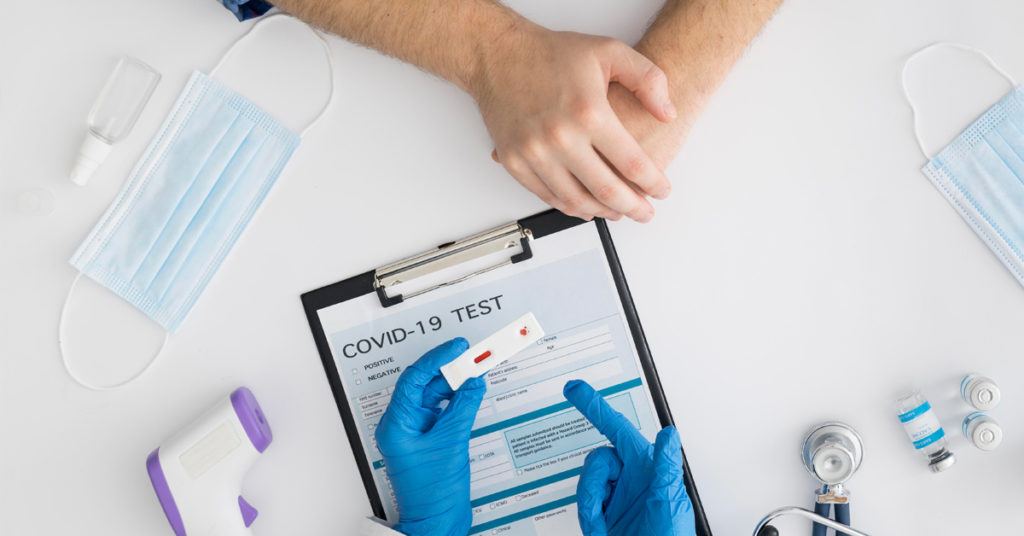Is it COVID-19 Diagnostic Test or Antibody Test?

Introduction
Battling with COVID-19 is unique experience for each of us. Understanding the two different COVID-19 tests can help us generate wiser decisions in particular with our health care needs. This means that you must know the available testing options for COVID-19.
There are two different types of COVID-19 Test – Diagnostic Test and Antibody Test. The Diagnostic Test indicates the presence of an active COVID-19 infection and require strict isolation or quarantine measures. On the other hand, the Antibody Test detects for antibodies produced by the body’s immune system in the presence of Severe Acute Respiratory Syndrome Coronavirus 2 (SARS-CoV-2), the virus responsible for COVID-19.
Diagnostic Tests
Do you want to test if you are infected by the COVID-19 virus? Use the diagnostic test.
Two ways to specify an active COVID-19 infection are by means of the molecular RT-PCR tests and the antigen tests. Samples from the diagnostic tests are collected by nasal or throat swab, and saliva, whereas samples from the antibody tests are extracted from the blood. Both samples are taken by a health care provider, usually a medical technologist or a registered nurse.
Molecular Reverse Transcription – Polymerase Chain Reaction (RT-PCR) test, also known as the nucleic acid amplification test (NAAT), is a diagnostic test for COVID-19 that spots the genetic material of the virus. The tests are usually done by nasopharyngeal swab – a technique that collects the sample from the posterior part of the nose up to where the swab reaches the throat. Saliva tests are also now accepted by some countries and institutions. However, from the medical community point of view, especially if the patient is scheduled for a certain procedure, the specialized areas such as operating rooms, endoscopies, cardiac cathlabs, among others, still require a nasopharyngeal swab test, as believed that samples directly from the nasopharynx can collect higher viral concentrations, thus a more accurate result. The presence of genetic material of the virus points a positive result while a negative result means traces of virus are nowhere to be found. Results of the tests come out in an average of 12 hours to 3 days, depending on whether the test will be done onsite or samples are to be sent to another accredited institution. Because of its typically high accurate results, it is the recommended COVID-19 test by the government authorities, and an official requirement for domestic transportations and international flights. As of now, this RT-PCR test is the gold standard of COVID-19 testing due to its high sensitivity of detecting the RNA strand accountable for the viral nucleic acid formation.
Antigen tests, also known as rapid tests, are COVID-19 diagnostic tests that checks for a presence of an antigen. Antigens are any foreign element, material or substance that activates the immune response to fight against it. Antigen tests are immunoassays that identify the existence of a specific viral antigen, which suggests a recent viral infection. It is commonly called a rapid test because it has a quicker turn-around time, approximately 15-30 minutes, as compared to the standard molecular RT-PCR test. The Centers for Disease and Control Prevention (CDC) already acclaimed to delete the word rapid “because FDA has authorized laboratory-based antigen tests.”
Like the RNA test, it is also done by nasopharyngeal swab. If the test results positive, it means that the antigen is present, yet the challenge with it is the probability of missing an active infection. If the test results negative but the patient manifests COVID-19 symptoms, it is safe to do a molecular RT-PCR as a confirmatory test. The antigen test is usually done as a screening test to a large number of people for quick identification of SARS-CoV2 and for the purpose of infection prevention and control measures. Another advantage of this test is that it has a cheaper cost in contrast with the molecular RT-PCR test.
Antibody Test
The second type of the COVID-19 test is the Antibody Test. This is also known as serological or blood test. Having this test helps recognize the antibodies produced by the immune system against SARS-CoV2. However, it cannot sense an active COVID-19 infection.
Antibodies defend the body against foreign invaders, in this case, a specific antigen like a virus. The antibodies detected are possible to have been present a long time ago, which one can query a quantified amount of time. They can be interpreted to someone who has been previously infected, no matter how many months have passed. As long as infection had occurred, antibodies are present. Samples from these tests are withdrawn by blood.
Antibody test results are usually released within 24 hours. Immunoglobulins are types of antibodies that specialize in binding to a particular antigen, in this case, the spike protein structure of SARS-CoV2. The two most common immunoglobulins that are checked from an antibody test are Immunoglobulin G (IgG) and Immunoglobulin M (IgM). A positive result of IgG, may indicate a long-term protection against SARS-CoV2, which shows that a person may have developed antibodies from getting a severe case of Covid-19 infection. On the other hand, since IgM is generally the first antibody produced when a virus attacks, a positive result of IgM may represent a new infection, or possibly newly vaccinated, as the immune system has started to contain the virus.
Conclusion:
With the non-stop increase of COVID-19 cases globally, early recognition is still one of the best infection prevention measures to raise awareness and avert further transmission among the public.
References:
